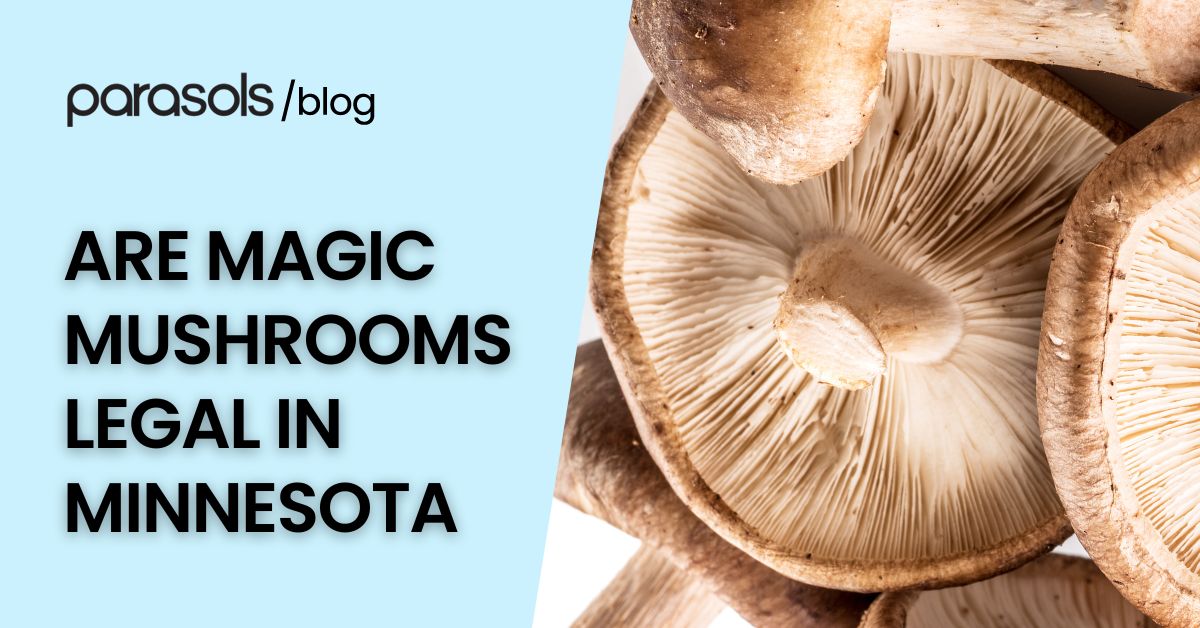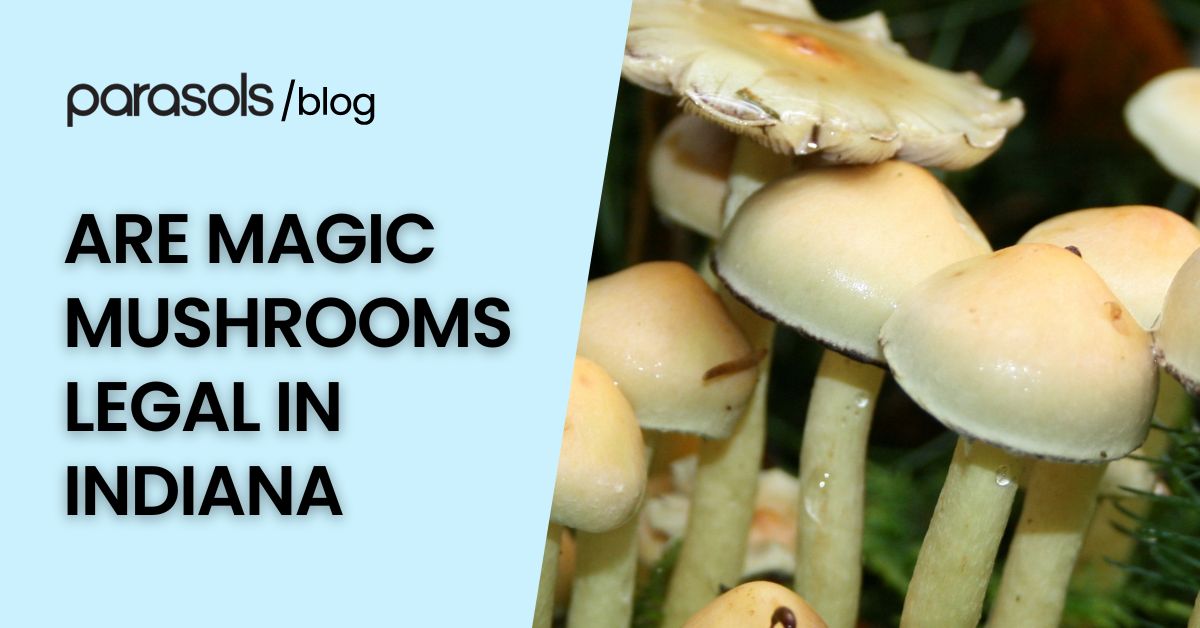In recent years, public conversations around psychedelic medicine have grown louder—from mental health forums to legislative chambers. As more people study the potential health benefits of psilocybin mushrooms, questions naturally arise about their legal status.
For Minnesotans curious about where things stand, here's a brief and clear look at how magic mushrooms are viewed under current state and federal law.
Overview on Psilocybin Mushrooms
Psilocybin mushrooms, often referred to as magic mushrooms or psychedelic mushrooms, are naturally occurring fungi that contain the psychoactive compound psilocybin. When ingested, psilocybin interacts with serotonin receptors in the brain, leading to altered perception, mood shifts, and, in some cases, profound introspective experiences.
Traditionally used in spiritual and entheogenic practices, these mushrooms have gained renewed interest in recent years for their potential medical use in treating conditions like anxiety, depression, and PTSD.
Are Magic Mushrooms Legal in Minnesota?
No, magic mushrooms—psilocybin‑containing mushrooms—are currently illegal in Minnesota. They remain a controlled substance under both federal law and state law, making possession, cultivation, and distribution subject to criminal penalties. However, momentum is building at the state level: the Minnesota legislature convened a psychedelic medicine task force to study the creation of a state‑regulated clinical program for the safe and appropriate use of psilocybin and other natural psychedelics.
This task force is working with the psychedelic medicine board and administrative services to recommend how to eliminate criminal and civil penalties for limited personal use, promote harm reduction, and establish possession limits.
While no decriminalization has passed in this legislative session, advocates continue pushing to legalize mushrooms for medical use under careful regulation—often emphasizing public safety, therapeutic potential, and lowest law enforcement priority.
Current Laws Regarding Magic Mushrooms in Minnesota

Here’s a clear breakdown of Minnesota’s current legal framework around psilocybin mushrooms and the ongoing efforts to change it.
Federal Classification and State Alignment
Magic mushrooms are classified as a Schedule I controlled substance under federal law due to the presence of the psychoactive compound psilocybin. Minnesota aligns with this classification, making the possession, cultivation, or distribution of psilocybin mushrooms illegal at the state level as well. These activities are subject to both criminal and civil penalties under current law.
Criminal Penalties and Enforcement Priorities
Possessing psilocybin mushrooms in Minnesota can lead to criminal charges. Small quantities intended for personal use may result in a petty misdemeanor, while larger amounts or evidence of intent to distribute can bring felony charges. Although not categorized as a violent crime, psilocybin-related offenses are still enforced. There is, however, growing advocacy to deprioritize such cases, especially when tied to personal use, and to reframe enforcement with a harm reduction focus.
Civil Penalties and Decriminalization Efforts
While civil penalties still apply in many cases, the state is actively evaluating reforms. Lawmakers and advocates have proposed reducing or eliminating penalties for individual possession in certain settings, such as private residences. These proposals are often rooted in public health strategies and seek to minimize punitive responses to non-violent drug offenses involving psilocybin-containing mushrooms.
Task Force and Board Recommendations
The Minnesota legislature has created a psychedelic medicine task force to examine how psilocybin and other natural psychedelics could be integrated into a state-regulated clinical program. This task force is working with a psychedelic medicine board and administrative services to develop recommendations that prioritize safe and appropriate use. Key issues under review include legal pathways, harm reduction strategies, and regulatory oversight mechanisms.
Possession Limits, Clinical Use, and Research
Currently, any amount of psilocybin is prohibited. However, the task force is considering guidelines that would allow limited possession for personal use under certain conditions. They are also evaluating clinical models that would allow supervised, therapeutic use of psilocybin in prepared form. Medical research, especially related to mental health conditions such as anxiety and PTSD, is a major driver behind these discussions.
Public Safety and Harm Reduction
A central theme in Minnesota’s evolving approach is the balance between personal freedom and public safety. Proposals under discussion would prohibit public use, commercial distribution, and possession in sensitive areas like public schools, while enabling individuals to access psilocybin safely under regulated conditions. Harm reduction measures aim to educate the general public, reduce legal consequences, and establish a clear distinction between personal decisions and commercial sale or influence.
Alternative Treatments for Shrooms in Minnesota
With psilocybin mushrooms still illegal under Minnesota and federal law, individuals interested in therapeutic options often study other legal and accessible alternatives. Here are some promising natural and clinical treatments gaining attention:
- Ketamine-Assisted Therapy – A legal medical treatment administered in controlled settings, often used for depression and PTSD; it serves as a legal analog to psychedelic experiences within the criminal justice system for mental health.
- MDMA-Assisted Psychotherapy (Clinical Trials) – Though MDMA is federally controlled, ongoing research and FDA breakthrough status make it a potential future option for conditions like anxiety or trauma, pending state‑regulated clinical programs.
- Psychoactive Compound Ibogaine Alternatives – Not currently approved, but some practitioners look to ibogaine-like compounds for potential off-label harm reduction—though these carry legal and safety complexities similar to psilocybin.
- Mindfulness and Meditation Programs – Widely accessible through public services or private providers in Minnesota, these non‑drug approaches support mental health and wellbeing without criminal penalties or clinical regulation.
- Holistic Psychedelic-Inspired Retreats – Use natural psychedelics alternatives like meditation, breathwork, or sensory therapy in retreat environments; they emphasize personal decisions, safety, and harm reduction, rather than controlled substances.
- Approved Off-Label Medication Therapies – Such as SSRIs or off-label psychedelics under compassionate‑use frameworks; although not “entheogenic plants,” they are part of emerging psychedelic medicine discussions in Minnesota.
- Research Participation Programs – Several Minnesota universities and mental health institutions offer research studies on psychedelic medicine and alternative therapies; participation supports science while avoiding criminal or civil penalties.
Consequences for Breaking Magic Mushroom Laws in MN
Violating psilocybin-related laws in Minnesota can result in a range of legal penalties. Below is a streamlined overview of the most common consequences:
- Petty Misdemeanor – Small personal-use possession may result in up to 90 days in jail and a $300 fine.
- Misdemeanor – Larger amounts or aggravating factors can lead to up to 1 year in jail and $3,000 in fines.
- Felony – Cultivation or intent to distribute can result in multiple years of imprisonment and significant fines.
- Civil Penalties – Low-level possession may lead to fines without jail, though reforms may change this.
- Criminal Record – Convictions can affect jobs, housing, and licenses, with limited expungement options.
- Reform Discussions – Proposals suggest removing penalties for private, personal use and focusing on harm reduction.
- Public Use or Vehicle Possession – Using or carrying mushrooms in public or in a car increases legal risk.
- Commercial Distribution – Selling or providing space for use can result in felony charges and severe penalties.
Final Thoughts

While psilocybin mushrooms remain illegal in Minnesota, the conversation around their potential medical use and decriminalization is gaining traction. Lawmakers, researchers, and advocates continue to study how to balance public safety with access to emerging treatments.
Stay informed about Minnesota's evolving laws on psychedelic medicine and study trusted resources to better understand safe, legal alternatives before making any decisions.
Frequently Asked Questions
Can I grow magic mushrooms at home in Minnesota?
No. Cultivating psilocybin-containing mushrooms is illegal and considered a felony under Minnesota law, regardless of intent or quantity.
Are synthetic psilocybin products treated the same as natural mushrooms?
Yes. Synthetic or lab-made psilocybin is treated the same as the naturally occurring compound and falls under the same controlled substance classification.
Is medical psilocybin available through prescription in Minnesota?
No. Psilocybin is not approved for medical prescription in Minnesota or federally, though research and pilot programs are under discussion.
Can magic mushrooms be used in religious ceremonies legally?
Not in Minnesota. There are no state-level exemptions for religious or entheogenic use of psilocybin mushrooms at this time.
Are there legal age restrictions if mushrooms become decriminalized?
While no age-based policies exist yet, future legislation or task force recommendations may include age limits to ensure public safety and responsible access.
What happens if I’m caught traveling with mushrooms across state lines?
Transporting psilocybin across state lines is a federal offense, subject to more severe penalties than state-level violations.
Do Minnesota laws treat psilocybin the same as LSD or MDMA?
While all are Schedule I substances, legal outcomes can differ depending on quantity, context, and the specific substance involved. Psilocybin often carries similar penalties but may be considered separately in reform discussions.
Can I talk to my doctor about psilocybin treatment options?
Yes. While they cannot legally prescribe it, some medical professionals are open to discussing emerging research, alternative treatments, and participation in clinical trials.



Leave a comment
This site is protected by hCaptcha and the hCaptcha Privacy Policy and Terms of Service apply.